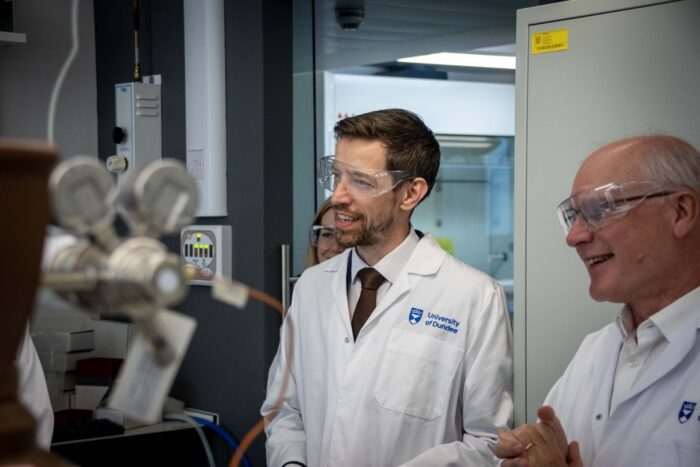The MJ | 11.04.2022 | John Alexander

While many may assume that the UK’s leading hotspot for life sciences would be Oxford or Cambridge, Dundee in fact hosts the most exciting life sciences cluster in the UK, with world-class companies, universities and research institutes all within a three-mile radius.
When judged by ‘citations-per-paper’, one of the most widely recognised metrics of scientific excellence, the 2020 QS World University Rankings in Biological Sciences placed University of Dundee at number one in the UK and Europe, and 16th in the world.
The influential CWTS Leiden Ranking for biomedical and health sciences impact in 2021 placed the city 5th in the UK and Europe, while in the most recent UK-wide assessment of research quality in UK higher education institutions – REF2014 – Dundee was ranked the top university in biological sciences.
Such rankings are evidence of the amazing work going on in Dundee to push the life sciences agenda, and how our city is developing cutting-edge technologies and products that enhance the well-being of millions of people around the world.
As well as an academic focus, we recognise the significant commercial drivers of life sciences activity which connect research, private business and job creation. We are determined to provide growing Dundee-based companies like Accenture, who use data and AI to develop new drugs, with the necessary facilities in order to retain talent and investment in the city. Dundee’s size – not too big, not too small: the ‘Goldilocks Factor’ – works to its advantage, enabling collaborative networks to be created and maintained between stakeholders.
Dundee is one of the UK’s best kept secrets when it comes to the depth and breadth of its life sciences research and innovation assets. With Dundee already supporting more than 1,700 roles in life sciences, we are further building on the sector’s success via our new life sciences innovation district, which Dundee City Council and the University of Dundee have agreed terms for. The district is funded through our £300m Tay Cities Deal, with £25m invested in a new Tayside Biomedical Cluster, which is to house a range of businesses that will push the boundaries of what is achievable.
One example of such pioneering innovations in Dundee is university-produced spinouts. The University of Dundee is recognised as one of the best universities in the UK for delivering major commercial spinout successes. These include Exscientia, a global pharma tech company working on AI-driven drug discovery and design, Amphista Therapeutics, the leading European targeted protein degradation (TPC) company with novel mechanisms to selectively remove disease-causing proteins, and Vascular Flow Technologies which designs and manufactures implantable vascular products that restore normal blood flow.
Dundee’s success is also attributable to the proactive work being done in encouraging life sciences sector firms to relocate to the city. Our stance is that we need to stop waiting on things happening ‘to’ our city: instead, we should be making them happen ‘for’ the city. Dundee has had – and has actively sought – many conversations with representatives of Dundee’s business community as well as potential investors to showcase Dundee’s pre-eminence in the life sciences sector, spelling out what our city has achieved, what it can offer, and what we are striving for.
But what is it that we are striving towards? Mapping out the city’s economic revival through our approach towards the development of life sciences. While Dundee’s history stretches back more than a thousand years, today we are a young and dynamic city where one in six people is a student of one of our institutions. Much of our potential lies in our young people, and we need to retain talent by making growing sectors such as life sciences an inextricable part of our city’s economy.
We have a clear vision of the city we want, and it doesn’t stop at holding onto our top university rankings and newly invested projects. We must continue pushing to innovate and invest in our future through collaboration – particularly with fellow Scottish cities, namely Inverness, Aberdeen, Stirling, Glasgow, Edinburgh and Perth – to realise the economic potential of the life sciences and STEM sectors.
Dundee, taking full advantage of our Goldilocks Factor, has discovered and delivered solutions to some of the hardest questions and challenges facing the world. And this work needs to continue, for Dundee, for Scotland and for the greater good. As former rector of Dundee University, writer and broadcaster Stephen Fry once said: “As a setting Dundee is as about as ideal – ludicrously ideal – as any setting could be.” We can only agree.
